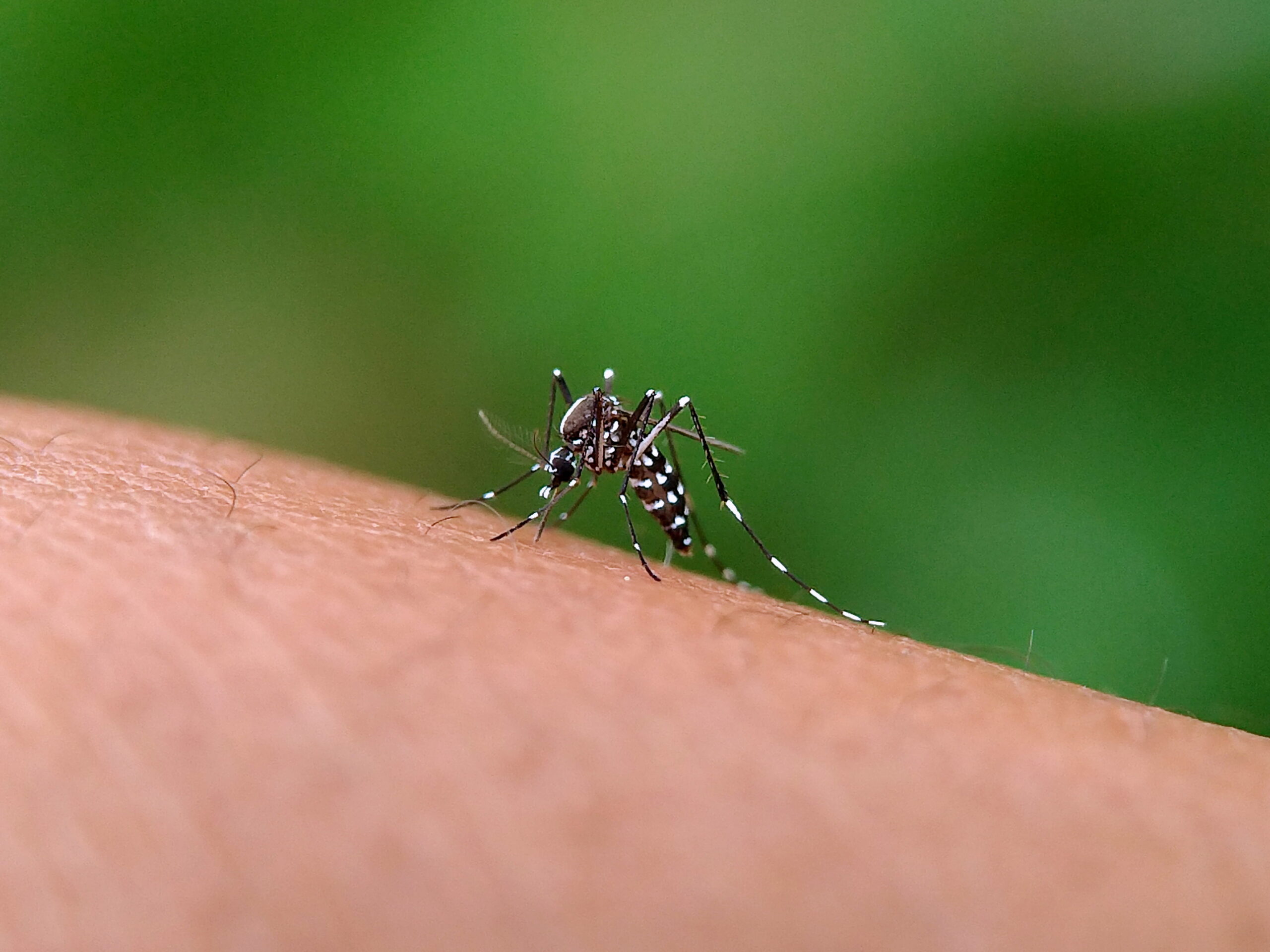Like most tropical countries Bali has mosquitoes and if you’re unlucky being bitten by mosquitoes can cause viral illnesses of varying degrees of severity.
Having said that, most travellers to Bali never catch a disease and the most discomfort they face is a bit of Bali belly as they acclimatize to the local water.
So, here’s everything you need to know about mosquito avoidance in Bali and what you must know before you travel to Bali.
Are There Mosquitoes In Bali?
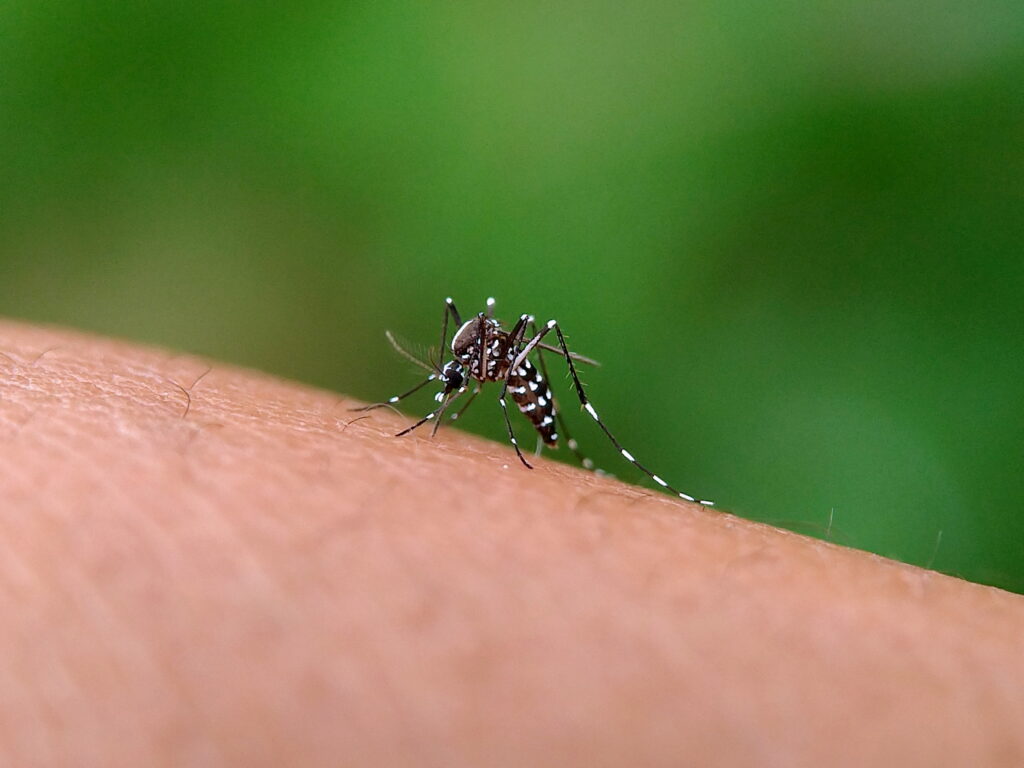
Yes, there are lots of mosquitoes in Bali. That doesn’t mean, however, that everyone has the same issue with these biting insects.
Some people seem to have a natural insect repellent and barely see a single bite in a year. Others are covered in bites whenever they step outside their front door and find themselves with itchy, red welts.
It is important to recognize that mosquitoes can bite at any time of the day. While they are busiest at dusk and dawn, there are species that love mid-daylight hours and others that come out in the evening!
The one place you don’t tend to find many mosquitoes is by the beach. This is because insects don’t deal well with salt water (there are no insects in the world’s seas and oceans!)
That means you should be able to rely on sunscreen as your protection on the sand, no need to bathe in DDT too.
Are The Mosquitoes In Bali Dangerous?
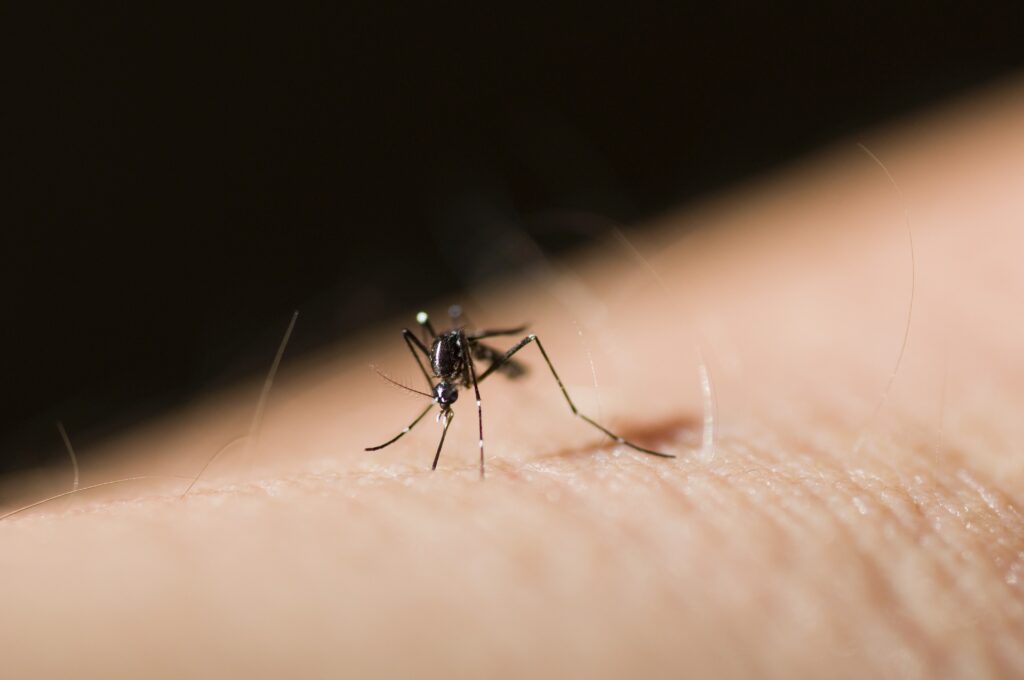
Mosquitoes in their own right are not dangerous. In fact, the average mosquito drains so little blood that you’d need to be bitten millions of times to notice any blood loss.
The problem is that mosquitoes are the ideal host for many different viruses, protozoa, etc. and these things can make you very sick indeed.
This, in turn, makes the mosquito the most dangerous animal on Earth. More people die each year of mosquito-borne diseases than of all other animal-related issues combined!
It’s estimated that since the dawn of time, billions of human beings have perished thanks to the mosquito’s unwanted guests.
There is also a much lower risk that your bites become infected when you scratch at them. If this happens, they will need treatment or can become life-threatening.
Where Do You Find Mosquitoes In Bali?
Everywhere but the beach. However, the more stagnant (still) water there is around, the more mosquitoes you will find.
Malaysia and Singapore have introduced strict laws to drain their nations of this kind of water. But no such law exists in Indonesia, as yet.
How Do You Avoid Mosquito Bites In Bali?
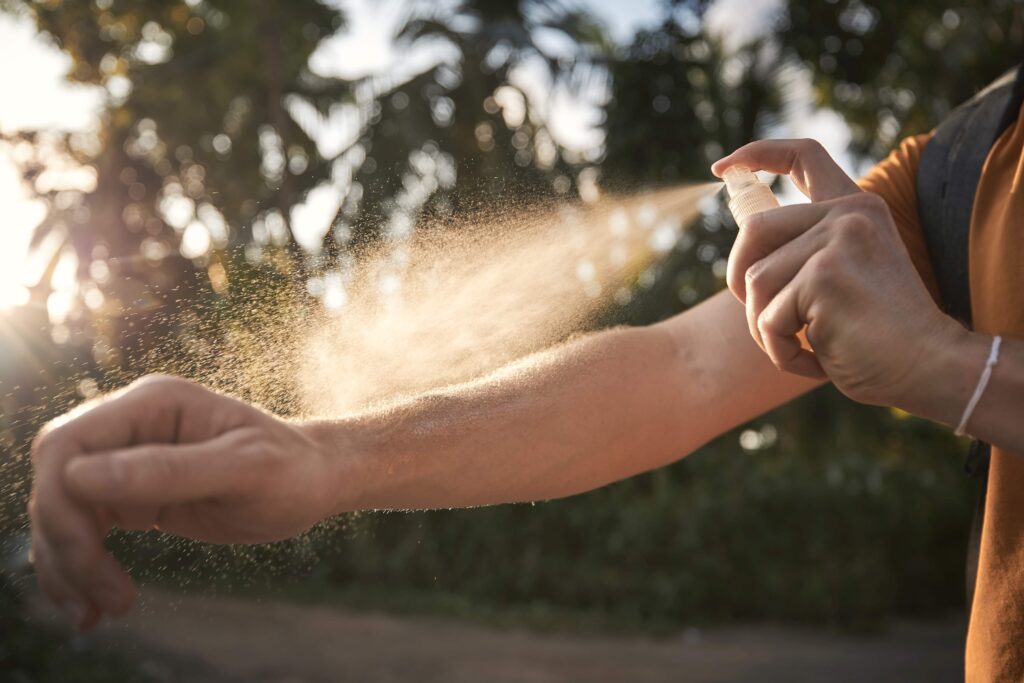
The best way to avoid mosquito-borne diseases is through mosquito avoidance techniques and these include:
Avoiding dusk/dawn in mosquito areas – the mosquitoes that carry dengue and malaria are most active at these times of day
Running the air-conditioning – drying out your apartment/room is a great way to make it inhospitable to mosquitoes
Using mosquito nets around beds, etc. – if you can’t get rid of all the flying menaces, using netting is a good way to keep them away from you while you sleep.
Wearing long sleeves and long trousers – mosquitoes only have a tiny area in which they can bite, they can’t bite through material
Insect repellents – using a spray on insect repellent can also help keep the mosquito away, however, you need to top up on a regular basis if you want the protection to last and remember to spray all over again after swimming
Is There A Time To Visit Bali Without Mosquitoes?
No. But there are more mosquitoes in the rainy season and fewer in the dry season.
This won’t mean no bites in the dry season, it just means fewer bites.
How Do You Treat Mosquito Bites In Bali?
The vast majority of mosquito bites carry no diseases and are entirely harmless. However, some people may find that the bites become red and itchy.
This is a histamine reaction (a mild allergy) and the best way to deal with it is to take an antihistamine or use an antihistamine cream. These can be purchased at any pharmacy in Bali or you can buy them before you travel to Bali.
Which Repellents Work For Mosquito Avoidance?

The most effective mosquito avoidance technique is to spray yourself in a repellent based on DEET (di-ethyl-meta-toluamide). This is considered to be harmless to humans but very unpleasant for insects.
It should keep off mozzies, fleas, ticks, etc. without a problem.
However, DEET sprays can occasionally cause bad skin reactions for some users and in this case, you might look for something containing picaridin or citronella (but be warned these products are much less effective).
There is absolutely no truth to the bizarre internet rumour that rubbing yourself in Marmite will keep insects away.
Which Diseases Do Mosquitoes Carry In Bali?
There are several viral diseases carried by mosquitoes in Bali.
Dengue Fever In Bali
The biggest problem is dengue fever which can kill if you’re unlucky. Dengue bites do not tend to lead to death the first time you contract dengue but the more often you are bitten, the more increased risk profile you face.
Symptoms
Dengue is like a very severe form of flu. The symptoms include:
Severe headaches and pain behind the eyes
Nausea and vomiting
Swollen glands and lymph nodes
Aching muscles and joint pains
Rash
Treatment
Treating dengue is not complicated and mainly you treat it like the flu. However, if symptoms persist or worsen, you should consult a doctor.
Bed rest
Drink lots of water and rehydration salts
Take paracetamol
A doctor might also monitor your platelet levels using blood tests and give you an IV for fluid replacement.
For more on this see the World Health Organization’s recommendations.
Malaria In Bali
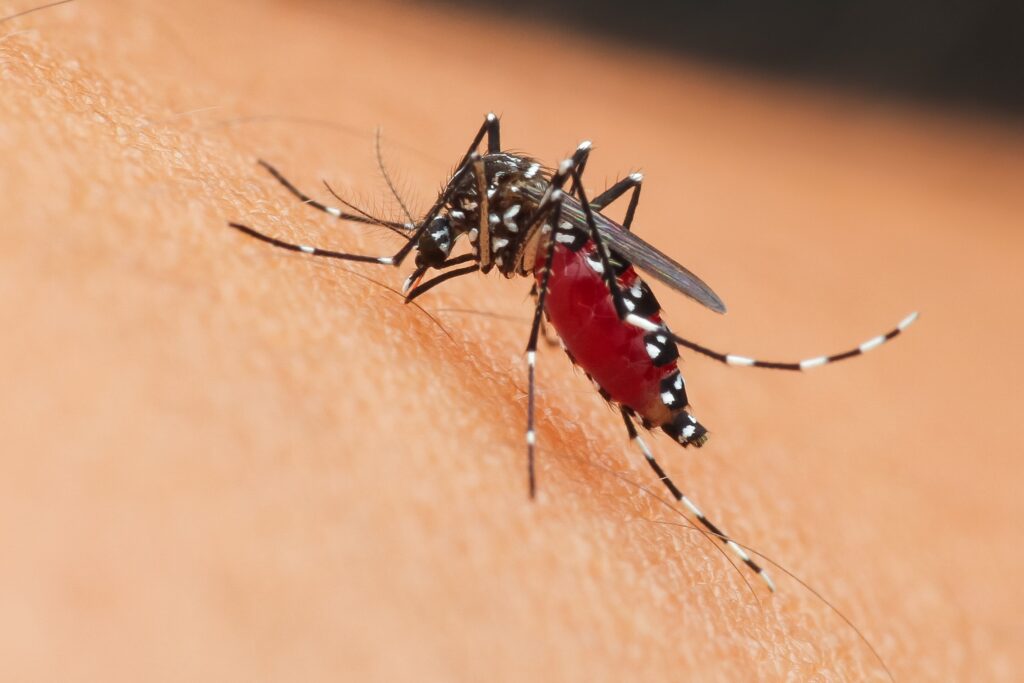
Malaria is also like a severe form of influenza but even more severe than with Dengue. Fortunately, malaria is so rare that it might as well not exist in most of Bali.
Symptoms
Chills
Fever
Headaches
Organ Failure
Malaria
Respiratory Distress
Treatment
See a doctor immediately – Malaria can quickly result in the patient’s death
Anti-parasitic agents like Artemisinin
Water/IV for fluid replacement
For more on this see the World Health Organization’s recommendations.
Zika Virus
The Zika Virus is not common in Bali but it can be a serious problem if it’s contracted through the exposed skin of a pregnant woman.
Zika is known to cause birth deformities. For this reason, a pregnant woman should always discuss a holiday in Bali with her doctor before she travels.
For more on this see the World Health Organization’s recommendations.
Chikungunya
This disease also has similar symptoms to malaria and dengue and it can be very severe. The joint pain, in particular, can last for months after infection.
You must get a diagnosis for Chikungunya and you should be aware that trying to treat this disease with aspirin, ibuprofen and other NSAIDs (non-steroidal anti-inflammatories) is very dangerous.
For more on this see the World Health Organization’s recommendations.
Other Insect-Borne Diseases & Viral Illnesses In Bali

There are also other insect-borne illnesses that you might encounter in Bali, in particular:
Japanese Encephalitis
Japanese encephalitis is a relatively rare condition that is also carried by mosquitoes and possibly also from ticks.
One thing that marks it out from the other common conditions in the region is that sufferers tend to have severe fits.
There is no specific treatment for Japanese encephalitis but medical support is recommended for anyone with this issue.
You can be vaccinated against this disease, however, unless you intend to spend a lot of time hiking in the countryside, you probably don’t need it and it is expensive.
For more on this see the CDC website.
Parasitic Infection
Parasitic infections can come from a range of insect bites but are most commonly caused by contaminated water.
They can lead to a huge range of varying conditions including amoebic dysentery and skin complaints.
If you suspect you have any kind of parasite, you should immediately visit a local clinic for testing.
In Context: Contaminated Food And Water Are The Biggest Health Risks In Bali
It is important to understand that the health risks posed by mosquitoes in Bali are fairly minimal.
Contaminated food is the number one risk to people as contaminated food can lead to food poisoning and Bali Belly.
Natural disasters are also a bigger problem for most tourists than mosquitoes.
It’s also worth noting that you are more likely to fall sick in rural areas than in urban areas because towns and cities tend to have much fewer sources of stagnant water for mosquitoes to breed in.
FAQs
How Bad Are Mosquitoes In Bali
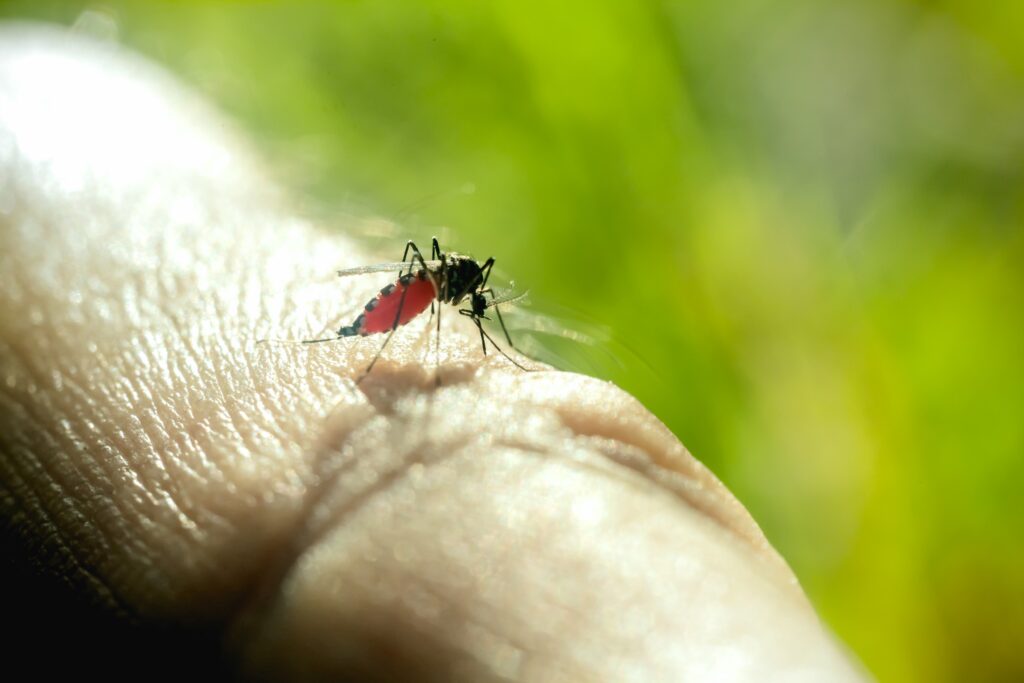
Bali has a moderate amount of mosquitoes all year round. Nowhere is ever 100% mosquito-free. However, getting bitten by a mosquito does not automatically lead to getting sick.
Can You Get Sick From Mosquito Bites In Bali?
Yes, mosquito-borne illnesses are quite common and it’s also possible for a bite to become infected.
How Do You Stop Mosquito Bites in Bali?
Take precautions such as wearing long clothes, not staying outside for long periods when mosquitoes are biting, and using a DEET-based insect repellent.
Do All Mosquitoes In Bali Carry Dengue Fever?
No. In fact, only one species of mosquito carries dengue. And not all members of that mosquito species carry dengue.
Where Is Dengue Most Common In Bali?
Officially, the highest risk areas in Bali for Dengue are in Badung and Denpasar a long way from where tourists tend to travel.
When Is The Mosquito Season In Bali?
There is no “season” for mosquitoes they’re here all year round. However, the wet season has more mosquitoes than the dry season.
What To Do If You Get Bitten By A Mosquito In Bali?
Nothing most of the time. If it itches use antihistamines. If it’s infected or you are showing symptoms of sickness, see a doctor.
Is Malaria A Concern In Bali? How Likely Is It To Get Malaria In Indonesia?
In theory, Balinese mosquitoes can carry malaria. In reality, the risks of malaria are very small on this Indonesian island except when hiking in a deep jungle. Major population centres may be considered malaria-free.
Do You Need Yellow Fever Vaccination In Bali?
Not normally, no. However, if you are travelling from an area that has a high rate of yellow fever infections, you must bring a vaccination certificate against Yellow Fever if you want to enter Bali.
Do You Need Rabies Vaccination In Bali?
Not normally, no. However, if you want to travel into rural areas of Bali, you should get one as a precaution as dog bites are more common out of the cities.
Under any circumstances when you are bitten by a dog or other mammal, you must get a rabies vaccination after the bite. Even if you have been vaccinated beforehand. Rabies is 100% fatal when symptoms show. So don’t mess about with this.
Do You Need Polio Vaccination In Bali?
Yes, it’s a good idea for everyone to take the Polio vaccination. Both in Bali and elsewhere.
Do You Need Vaccines For Hepatitis B or Other Strains Of Hepatitis In Bali?
Only if you intend to have sex with someone in Bali who is not your usual partner. Hepatitis B is mainly caught through sexual contact and it’s common in Bali.
Do I Need Malaria Tablets For Bali? Should I Get A Malaria Vaccine For Bali?
No. As long as you practice mosquito avoidance, you should be fine.
Malaria medication can have fairly unpleasant side effects, so, it’s best avoided unless it’s 100% necessary.
Final Thoughts On Mosquito Bites, Health Risks, & Viral Illness In Bali
It is always better to prevent mosquito bites than it is to try and treat a viral illness that stems from those bites.
It’s not always possible to avoid every bite but the more precautions you take, the less likely it is that you will be bitten and get sick.
The good news is that most people manage to get through their stay in Bali with mosquito-induced medical conditions or having to seek medical attention and your trip should be fine too, if you follow the advice above.

